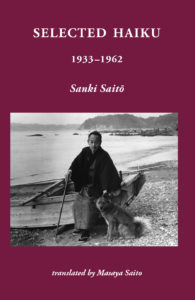 Sanki Saitō is a towering figure in twentieth-century haiku. Although he did not begin to write haiku until the age of 33, he then rapidly became a leading figure in the poetically radical New Rising Haiku movement. He was silenced in 1940, after publishing his first collection, Flag, having been arrested by the Special Higher Police on the charge of violating the Peace Preservation Law. He began to write again after 1945, and between 1948 and 1962 he published three major collections of haiku: A Peach at Night (1948), Today (1952) and Metamorphoses (1962). Vigorous, earthy, observant, tragic, hilarious, sensuous, unillusioned, powerful, ironic – these haiku are among the major achievements in postwar Japanese poetry.
Sanki Saitō is a towering figure in twentieth-century haiku. Although he did not begin to write haiku until the age of 33, he then rapidly became a leading figure in the poetically radical New Rising Haiku movement. He was silenced in 1940, after publishing his first collection, Flag, having been arrested by the Special Higher Police on the charge of violating the Peace Preservation Law. He began to write again after 1945, and between 1948 and 1962 he published three major collections of haiku: A Peach at Night (1948), Today (1952) and Metamorphoses (1962). Vigorous, earthy, observant, tragic, hilarious, sensuous, unillusioned, powerful, ironic – these haiku are among the major achievements in postwar Japanese poetry.
In Selected Haiku 1933–1962, 1,141 of Sanki’s haiku have been vividly and powerfully translated by Masaya Saito, who, in addition, has written a full and informative introduction, outlining Sanki’s life, describing his key role in the New Rising Haiku movement of the 1930s, elucidating the political and historical context in which he wrote, and discussing his mature postwar work.
‘Haiku, this oddball. Short and small, unfree, difficult, and its attractiveness supreme,’ began Sanki Saito’s account of his involvement with the world’s shortest verse form. Here Masaya Saito (no relation) has translated a selection of well over a thousand haiku of Sanki, illuminating the kaleidoscopic aspects of Sanki’s art. – Hiroaki Sato
An important poet deserving of this new exhaustive translation, made eminently more accessible by Masaya Saito’s painstaking biography. Often his own worst enemy, Sanki’s haiku plumb the depths of a turbulent, iconoclastic life during Japan’s embrace of modernity and war. – Paul Miller, editor, Modern Haiku
At a time when English-language haiku is exploring new directions in form and content, these fresh translations of Sanki’s haiku remind us that the seasons and their manifestations are, as he puts it, ‘nothing but the outermost layer of the truth of actual existence,’ and that it is the purpose of all haiku ‘to immerse ourselves deep in the truth of actual being.’– Lee Gurga, editor, Modern Haiku Press
Simon Collings has published a review of Sanki in Litter, in which he says that ‘Sanki’s haiku, full of acute observation, emotional directness and humour, speak for themselves and are the best recommendation for why he deserves our attention.’ Click here to read the whole review.
May 2023. 296 pages. 9 x 6/229 x 152 mm. ISBN 978-4-907359-43-0 (paperback).
Click here to read a PDF excerpt from this book.
Click here to buy from Amazon in the US; click here to buy from Amazon in Japan; Click here to buy from Amazon in the UK.